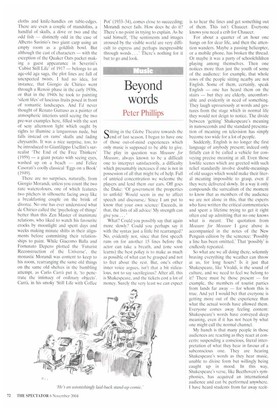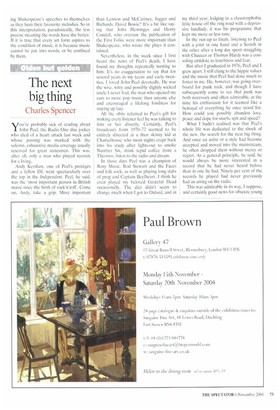M us k
Beyond words
Peter Phillips
Sitting in the Globe Theatre towards the end of last season, I began to have one of those out-of-mind experiences which only music is supposed to be able to give. The play in question was Measure for Measure, always known to be a difficult one to interpret satisfactorily, a difficulty which presumably increases if one is not in possession of all that might be of help. Full of untried concentration we welcome the players and lend them our ears. Off goes the Duke: 'Of government the properties to unfold/ Would seem in me to affect speech and discourse,/ Since I am put to know that your own science/ Exceeds, in that, the lists of all advice/ My strength can give you.
What? ' What? Could you possibly say that again more slowly? Could you perhaps say it with the syntax just a little bit rearranged? No, evidently not, since that first speech runs on for another 15 lines before the actor can take a breath, and (one soon learns) the best policy is to make as much as possible of what can be grasped and not to fret about the rest. But, one's other inner voice argues, isn't that a hit ridiculous, not to say sacrilegious? After all, this is Shakespeare, and the tickets cost a lot of money. Surely the very least we can expect is to hear the lines and get something out of them. This isn't Chaucer. Everyone knows you need a crib for Chaucer.
For about a quarter of an hour one hangs on for dear life, and then the attention wanders. Maybe a passing helicopter, or a mobile phone, has broken the thread. Or maybe it was a party of schoolchildren playing among themselves. Then one notices more than just the youth of some of the audience: for example, that whole rows of the people sitting nearby are not English. Some of them, certainly, speak English — one has heard them on the stairs — but they are elderly, uncomfortable and evidently in need of something. They laugh uproariously at words and gestures from the stage which in normal life they would not deign to notice. The divide between 'getting' Shakespeare's meaning in nanoseconds and the standard presentation of meaning on television has simply become too wide for a lot of people.
Suddenly, English is no longer the first language of anybody present; indeed only fitfully can it be called a vehicle for conveying precise meaning at all. Even those lowlife scenes which are greeted with such relief standardly involve double-meanings of old usages which would make their literal meaning impossible to grasp, even if they were delivered slowly. In a way it only compounds the surrealism of the moment to know that as members of the audience we are not alone in this, that the experts who have written the critical commentaries and spent a lifetime trying to get it right often end up admitting that no one knows what is meant. The quotation from Measure for Measure I gave above is accompanied in the notes of the New Penguin edition by the sentence: 'Possibly a line has been omitted. That 'possibly' is endlessly repeated.
So what are we all doing there, solemnly braving everything the weather can throw at us, for long hours? Is it just that Shakespeare, like Vivaldi, is the sound of culture, and we need to feel we belong to it? There must be those present — for example, the members of tourist parties from lands far away — for whom this is true. And yet I would bet that everyone is getting more out of the experience than what the actual words have allowed them. Everyone comes away feeling content: Shakespeare's words have conveyed deep meaning, even if it has not been by what one might call the normal channel.
My hunch is that many people in those audiences are reacting as they react at concerts: suspending a conscious, literal interpretation of what they hear in favour of a subconscious one. They are hearing Shakespeare's words as they hear music, unable to divine form but willingly being caught up in mood. In this way, Shakespeare's verse, like Beethoven's symphonies, has acquired an international audience and can he performed anywhere. I have heard students from far away recit
log Shakespeare's speeches to themselves as they hum their favourite melodies. So in this interpretation, paradoxically, the less precise meaning the words have the better. If it is true that every art form aspires to the condition of music, it is because music cannot be put into words, or be confined by them.



























































































































 Previous page
Previous page